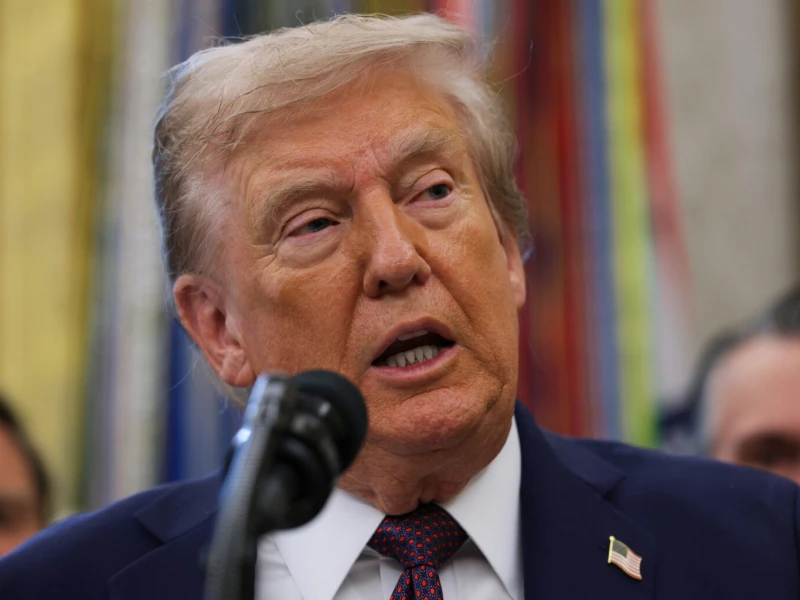If U.S. Navy Vice Admiral Richard Correll expected a smooth confirmation hearing on Thursday to become the commander of America’s nuclear forces, those hopes evaporated at 9:04 p.m. the night before.
That was when President Donald Trump stunned the world by announcing on social media that he had instructed the U.S. military to “start testing our Nuclear Weapons,” arguing that the United States could not afford to fall behind Russia and China.
Russia is second, and China is a distant third, but will be even within five years,” Trump wrote.
During a 90-minute hearing at the Senate Armed Services Committee on Thursday morning, Correll faced a barrage of questions about Trump’s remarks from bewildered lawmakers — reflecting the confusion the president’s statement caused in Washington and abroad.
The committee’s top Democrat, Senator Jack Reed, asked whether resuming U.S. nuclear explosive testing would be destabilising and risk sparking a new global arms race.
If confirmed as the commander of STRATCOM, my role would be to provide military advice on any discussions on the way ahead with respect to testing,” Correll replied carefully.
Correll, nominated in early September to lead the U.S. Strategic Command (STRATCOM) — responsible for nuclear deterrence and strike capabilities — repeatedly avoided speculation during the hearing. At one point, Senator Angus King suggested Trump’s post might refer to testing delivery systems such as missiles rather than nuclear warheads.
I don’t have insight into the President’s intent. I agree that could be an interpretation,” Correll said.
U.S. Moratorium in Question
Officials in Washington on Thursday did not clarify whether Trump’s remarks referred to testing nuclear delivery systems or to ending a 33-year moratorium on explosive nuclear tests.
Experts warned that a return to testing would be highly disruptive, risk escalating global tensions, and evoke Cold War anxieties.
Vice President JD Vance defended the notion of testing, saying it was part of ensuring the U.S. arsenal remained functional.
For decades, the U.S. and other nuclear powers have relied on advanced computer simulations instead of detonating actual warheads to maintain readiness.
There is no good reason for the United States to resume explosive nuclear testing — it would actually make everyone in the U.S. less safe,” said Tara Drozdenko, director of the global security programme at the Union of Concerned Scientists. “The U.S. has so much to lose and so little to gain from resuming testing.”
Sending a Message to Moscow and Beijing
Many analysts suggested Trump’s post was intended to project strength ahead of his meeting with Chinese President Xi Jinping in South Korea and to send a message to both Moscow and Beijing.
In his social media post, Trump said he had ordered the Pentagon to start testing “on an equal basis” and that the process would “start immediately.”
Only North Korea has conducted a nuclear test explosion in this century, most recently in 2017.
Russia, accused by Washington of conducting low-yield tests and lacking transparency in its nuclear activities, has not conducted a full-scale explosion.
Russian President Vladimir Putin has previously warned that Moscow would respond in kind if any other nation resumed nuclear testing.
China, meanwhile, has resisted U.S. efforts to engage in arms control talks, arguing that its nuclear forces are much smaller than those of the U.S. or Russia.
Beijing is rapidly expanding its arsenal but has shown little interest in trilateral negotiations.
If the goal is to generate leverage to force China to negotiate, I think that’s unlikely to work,” said James Acton, co-director of the nuclear policy programme at the Carnegie Endowment for International Peace.
Beijing’s foreign ministry urged Washington to uphold its commitment to the moratorium and honour obligations under the Comprehensive Nuclear-Test-Ban Treaty.
Risks of Escalation
Analysts at Ploughshares, a foundation focused on reducing nuclear threats, warned that breaking the moratorium could backfire, allowing rivals to justify renewed testing.
The United States has conducted the majority of all nuclear test explosions and retains extensive data from its 1,030 tests since 1945,” the organisation said. “A return to testing will benefit U.S. adversaries by allowing them to catch up in nuclear research and weapons development.”
A source at the Department of Energy, speaking on condition of anonymity, said that any potential test would likely take place deep underground at a Nevada site, which is required to remain capable of conducting tests within 36 months.
Senator Jacky Rosen of Nevada strongly opposed any return to testing, recalling the state’s long history of exposure to U.S. nuclear detonations between 1951 and 1992.
I’m going to be crystal clear: I will not let this happen. Not on my watch,” Rosen said.
# Agencies


-1762006612.webp) Prev Post :
Prev Post :
